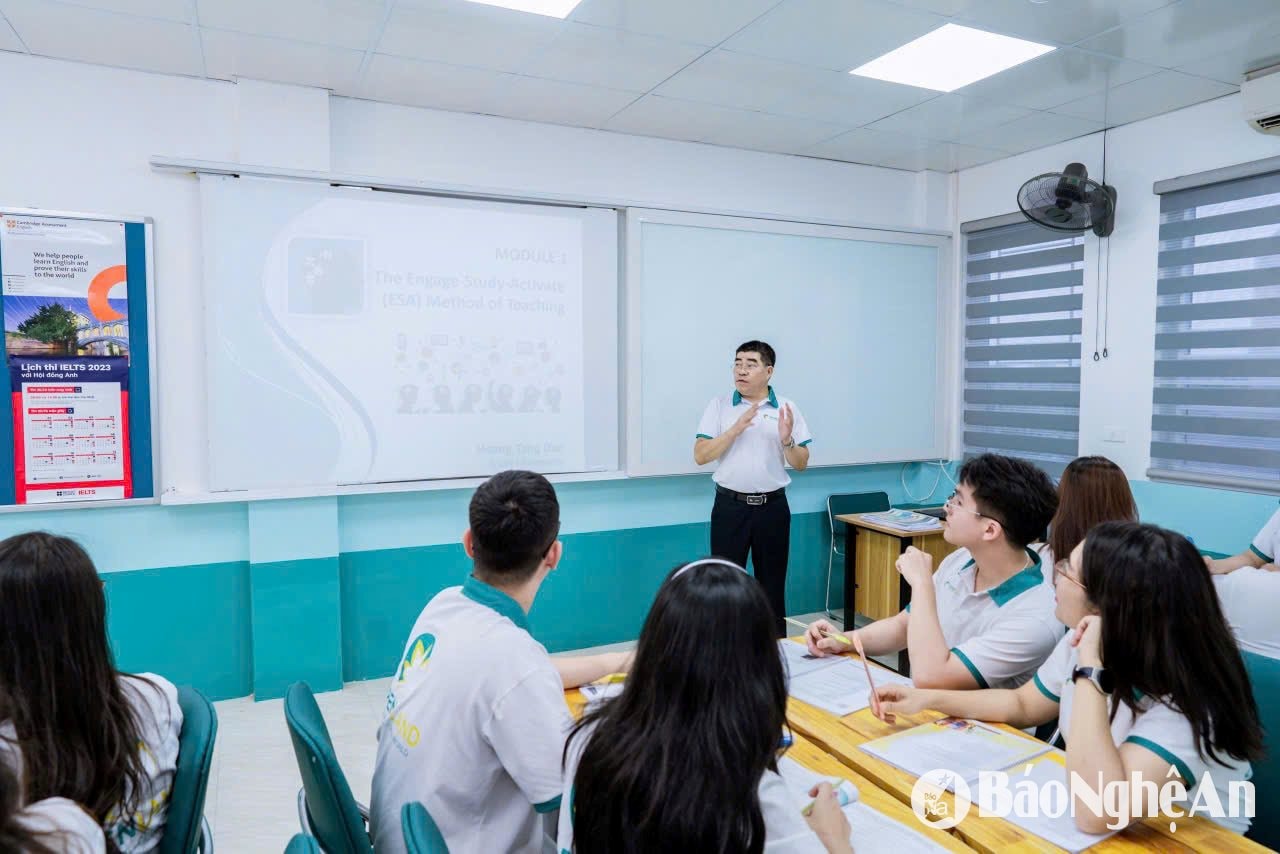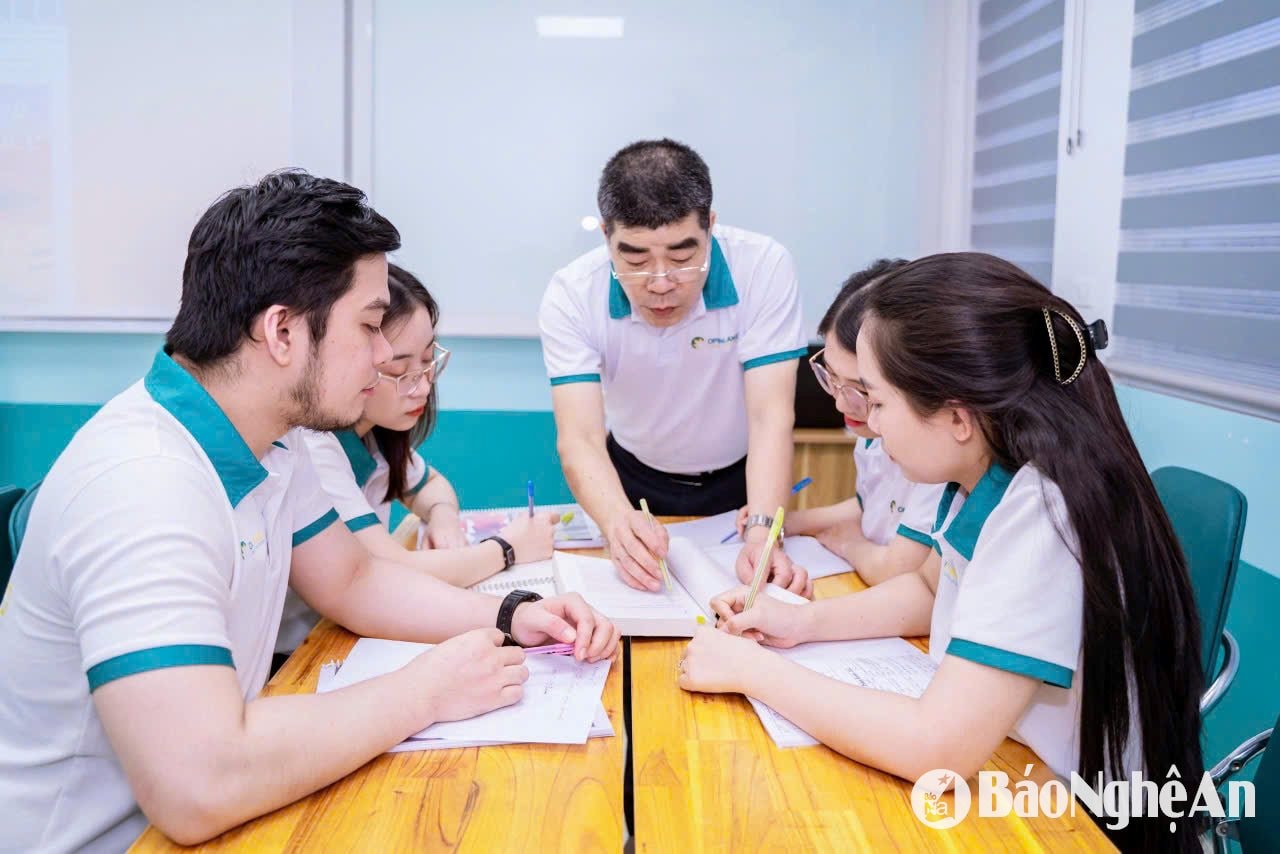High School Graduation English Exam 2025: Profound, but is it accurate?
Nghe An Newspaper respectfully introduces an article by teacher Hoang Tang Duc - English lecturer - Vinh University - Author of English textbooks for grades 1-12. This is a candid perspective from someone who accompanies teachers and high school students every day - from teaching and training to research and writing books.
This year, the 2025 high school graduation English exam has many notable innovations - but also suggests many things to ponder, when applied to the reality of teaching and learning English in Vietnamese high schools.

FOUR POSITIVE HIGHLIGHTS OF THIS YEAR'S EXAM
1.High authenticity:The source material is drawn from authentic texts – newspaper articles, event promotions, academic content – giving students access to real language, rather than just “studying for an exam”.
2.Focus on context:No more isolated grammar tests, questions requiring appropriate word usage, logical paragraph arrangement, and correct paraphrasing - this is the right direction in assessing language proficiency.
3.Approaching comprehensive assessment:Many questions assess linguistic thinking abilities such as inference, synthesis, and idea organization - reflecting a tendency to test real abilities, rather than discrete knowledge.
4.Step by step approach to international exams (IELTS, TOEFL):
The test demonstrates an attempt at vertical assessment – classifying students based on their performance, rather than simply testing knowledge en masse. This is a modern approach to assessment, but requires a lot of foundational conditions to implement it fairly and effectively.
HOWEVER, there is one fact that cannot be ignored: The exam is going FASTER than the students' capacity and the current teaching conditions in high school.
CORE PROBLEM: ONE EXAM - TWO NEARLY OPPOSITE GOALS
This exam serves two very different purposes:
•High school graduate:Ensure students complete the program - meaning they only need to reach standard B1 (level 3) according to Circular 32/2018/TT-BGDDT.
•University admission:There is a need for clear classification of academic ability, especially for top schools - requiring questions at B2-C1 level to ensure differentiation.

Two goals - two completely different assessment logics - but wrapped up in 40 objective multiple choice questions of a single test. And the consequence is: the test is pulled towards academics, and the B1 output standard becomes obscure.
WORRYING CONSEQUENCES
•Students in disadvantaged areas are heavily affected:Many students, especially in rural and mountainous areas, only study to "graduate" - now they are evaluated by exam questions that exceed the standard with many C1 questions, not suitable for their actual abilities.
•Opportunities are narrowed from the very first choice:Many people will argue that English is an optional subject in the high school graduation exam - if you do not do well, you can choose another subject. But saying so is to ignore a harsh truth: is it possible that a student in a rural area, despite limited conditions but with the will and effort to self-study English, did not dare and could not choose to take the English exam from the beginning - just because he knew in advance that the exam would be "too much"?
•General teachers are confused in orientation:They have to choose between two options: teach according to the standard program (B1) or follow the exam preparation style that is biased towards B2-C1, leading to disorientation in teaching.
•Family and society bear more pressure:Parents, especially those in disadvantaged areas, are forced to spend extra money on tutoring and exam preparation, creating a significant economic burden. This deepens the gap between regions and classes, going against the principle of fairness in public education.

MEANWHILE, THE 2018 General Education Program CLEARLY STATES:
“After completing the English subject at the high school level, students can achieve Level 3 English proficiency according to the 6-level Foreign Language Proficiency Framework for Vietnam. Specifically: Can understand the main ideas of a clear, standard speech or text on familiar matters related to work, study or leisure; can deal with most situations likely to arise in the local environment; can write simple text on topics that are familiar or of personal interest; can describe experiences, events, dreams, hopes and ambitions and briefly give reasons and explanations for opinions and plans”.
However, the test does not have any type of written question that really meets the above objectives - not even a question type that is suitable for personal communication purposes. The test does not require students to express their personal experiences, thoughts or opinions in order to demonstrate proper qualities and behaviors. Instead, the test mainly focuses on testing reading comprehension skills, vocabulary and academic thinking at a high level, exceeding the prescribed output standards.
SO WHAT NEEDS TO CHANGE TO MAKE THE EXAM TRULY FAIR AND MORE EFFECTIVE?
1.Clear goal separation:If the “two-in-one” exam (both graduation and university admission) is still maintained, the ratio of questions according to the competency levels (B1 - B2 - C1) should be transparently announced. Even better, there should be a separate exam for university admission to ensure the correct function and goal for each subject.
2.Increase content that reflects actual capabilities:The exam needs to have an additional section assessing writing skills, describing personal experiences or simple arguments (can be designed in the form of objective multiple choice questions) - in accordance with the requirements of Level 3 according to the 6-level NLNN Framework, as prescribed in the 2018 General Education Program.
3.Respecting the output standards of the general education program:The questions should be based on the official requirements of the program – avoid exceeding the standards too much. Otherwise, it will lead to deviation from the teaching and learning objectives, creating injustice and unnecessary pressure for learners.
4.Prepare synchronously and change teaching and learning thinking:Before any major adjustment of the exam, there needs to be a thorough, extensive and systematic preparation process for both teachers and students. Teachers need to be trained to understand the innovative spirit of the program, thereby changing their approach - not just teaching isolated language knowledge but helping students develop the ability to use the language in real communication situations, connecting with social and global issues. Students also need to be properly oriented that learning English is for use, for integration, not just for exams.
CONCLUSION - WHEN THE DOOR OF JUSTICE IS THE FIRST THING THAT NEEDS TO BE OPEN
I write these lines not to judge, but so that all of us - teachers, students, parents, administrators and test makers - can look back honestly, soberly and responsibly.
AND REMEMBER:
1. A test can be very academically sound. But if it deviates from the program's goals and does not truly reflect the abilities of the majority of students, it is not a successful test. And the saddest thing is that what we are testing is no longer language ability - but the level of resistance to disproportionate pressure.
2. In a national exam - where the future of hundreds of thousands of students is decided - fairness is not a privilege, but a minimum principle.
3. Education is not a race for the best, but a journey open to all.
4. If innovation only makes exams “higher and more difficult” and forgets about students who are struggling on the sidelines or left behind, then we are losing the very goal that general education pursues: giving opportunities, not taking away hope.
5. As direct teachers, English teachers need to look beyond grammar structures or test-taking tips. Teaching a language is not just about teaching discrete knowledge, but about exposing students to the language in real-life communication situations that are close to life and related to issues that the world is concerned about. We need to help students understand that learning English is about using it - to connect, to understand the world and to change their lives - not just about passing an exam.
I BELIEVE THAT:
- A true exam is one that opens doors - not closes dreams.
- Let's work together - teachers, students, parents, test makers and administrators - to build an exam that is not only technically correct, but also educationally correct./.



